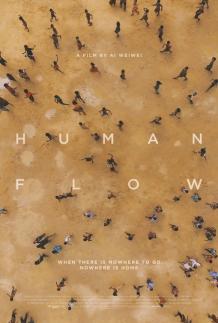Chinese visual artist and human rights activist Ai Weiwei presents a phenomenal image of our shrinking world in "Human Flow." Long on the outs with the Chinese government, he has lived for years in Berlin as the art world's most famous refugee/immigrant. Turning his creative gifts to recording the experiences of less fortunate outcasts, Ai has fashioned an ambitious, globe-trotting, important film. It is the most strikingly beautiful and vividly moving account of international borders and those fated to cross them that has ever been recorded.
Taking a superb camera crew across the Mideast, Europe and the U.S.-Mexican border, Ai observes people seeking freedom and protection from their troubled homelands, and the iron curtains they encounter on their journeys. The film isn't partisan, it is a grim observation of the true barbarities of life in a war-wracked homeland and the limited resources of sanctuary in nations beyond it. Ai offers us the sort of cinematography that cannot be unseen. He takes us inside a war-ravaged Lebanese apartment building where one ravaged bedroom features magazine pages of bridal gowns still taped to a wall blown open. We are shown scores of passengers crossing the Mediterranean in huge pontoon boats after dark, detectable only because of their flare-orange life jackets, and platoons of new arrivals in Europe glowing like nuggets of gold as they are wrapped into mylar thermal blankets.
He rarely offers narrative clarifications, framing events in flashes of printed informative data or poetic quotations instead. Ai asks a few of the people facing his lens to share their personal stories, but he knows that often simply keeping a fixed gaze on a desperate person's face tells everything we need to know. The truth laid bare is enough. Those who do speak on camera are never patronizing. As Maria Kipp, a representative of Berlin's Tamaja Shelter, explains, "more important than food and shelter is to make them feel that they are human beings and we actually care about them."
Like Picasso's brutalist "Guernica" or Goya's disturbing "Disasters of War" prints, the film finds an eerie beauty in distressed regions of Kenya, Iraq, Gaza, sub-Saharan Africa, Myanmar, Jordan and Syria. It pulls into focus the collateral damage such disasters can spark even generations afterward. Maha Yahya, acting director of the Carnegie Middle East Center, says it memorably: "If children grow up without any hope, without any prospects for the future, without any sense of them being able to make something of their lives, then they will become very vulnerable to all sorts of exploitation, including radicalization."
Courtesy: Colin Covert, Minneapolis Star-Tribune



